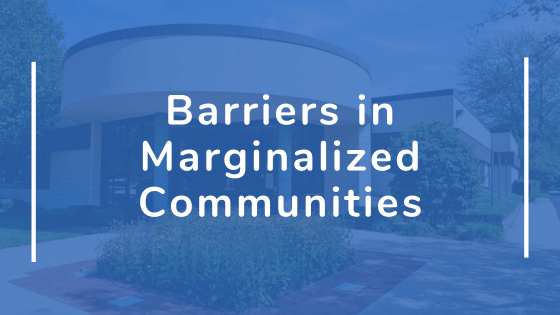10 Barriers Marginalized Survivors Encounter
After Surviving Domestic and/or Sexual Violence
Brad Hieftje, LLMSW
Men As Allies Coordinator
Marginalized populations are groups and communities that experience discrimination and exclusion because of unequal power relationships across economic, political, social, and cultural dimensions. Examples of marginalized communities are racial/cultural minorities, the LGBTQ+ community, those with limited English proficiency, persons with cognitive or physical impairments, and more.
Survivors from marginalized communities or underserved populations often encounter additional barriers to seeking safety and receiving effective assistance. Below are just some of the barriers that survivors in marginalized communities may experience after surviving domestic violence, sexual assault, stalking, or abuse.
- Stereotypes
Defined as widely held beliefs and expectations that people have about certain groups, stereotypes aim to hypersexualize, objectify, and dehumanize marginalized survivors. One problematic example is the Jezebel stereotype, which portrays black women as seductive, tempting, promiscuous, fast, and sex-crazed. This creates a false notion that women of color cannot be assaulted due to their “insatiable” appetite for sex and “salacious” physical appearance. Stereotypes like this significantly hinder the chance survivors will be believed and supported after telling their story.
- Erasure/Invisibility
In order to maintain an oppressive status quo and misrepresentation, our society deliberately removes and omits certain identities and issues. One example of this is the gender binary, which erases the existence of trans and non-binary survivors. Agencies that serve women only, lack of gender-inclusive restrooms, and exclusively using he/she pronouns create additional barriers for these survivors. As a result, trans and non-binary voices may not be heard or respected or may even be turned away.
- Fear of Being Outed
The disclosure of an LGBTQ+ person’s sexual orientation or gender identity without their consent can have serious consequences. They may experience discrimination, physical violence, and the denial of employment, housing, and public benefits. In addition, they may be shunned, shamed, and disowned by family, friends, and houses of worship. The possibility of further victimization and hardship only complicates the process of healing for many LGBTQ+ survivors.
- Poverty/Homelessness
Women of color, LGBTQ+ folk, and people living with disabilities experience poverty and homelessness at disproportionate rates. This is not a coincidence, but another reflection of oppression in our society. Survivors living in these circumstances are often unable to afford legal and healing services or obtain the transportation necessary to receive treatment. Furthermore, they may not be able to divert time and energy away from meeting their basic survival needs.
- Discrimination
Marginalized survivors also experience unjust or prejudicial treatment. For example, those who are undocumented may be deported, or experience xenophobia, microaggressions, and bias simply because of their race, ethnicity, and immigration status. Gatekeeping, which is a system that controls access to resources, is another discriminatory barrier entrenched in most services across the country. Together, these barriers can make it life-threatening to disclose and even prevent assistance to those who take that risk.
- Police Brutality/Mass Incarceration
For many survivors, reporting their victimization comes with additional risks. Research shows survivors of color experience disproportionate rates of excessive use of force by police and are significantly more likely to be incarcerated over their white counterparts. This creates a fear and distrust of police, making it difficult to report in times of need. In addition, survivors of color may decide not to report their abuser if they too are at risk of police brutality and/or mass incarceration.
- Stigma
Survivors who are perceived to be “dirty”, “immoral”, and “disgraceful” are experiencing the detriments of stigma. They are often blamed for the abuse and left feeling ashamed of what occurred and how their brain responded. For sex workers and trafficking survivors, they endure multiple forms of stigma at the same time. This amount of shame can lead to depression, suicidal ideation, isolation, and self-harm. In order to avoid this, survivors may refrain from reporting and seeking services.
- Language
Survivors who don’t speak English, or speak English as a second or other language, face a shortage of accessible resources. The lack of non-English services can include sexual assault nurse examinations (SANEs), case management, therapy, and legal advocacy. Twenty-four hour helplines, which are usually relied on to connect survivors to services, may also be inaccessible. As a result, survivors either fall through the cracks or feel “othered” after being sent to an alternative service.
- Accessibility
In addition to language barriers, an agency’s programming and physical space may also not be accessible or accommodating to survivors living with disabilities. Examples include antiquated SANE beds, lack of ramps and elevators, and confidentiality mandates that exclude sharing information with personal care assistants. This may lead to survivors feeling invisible and insignificant, on top of not having their needs met.
- Internalized Oppression
When marginalized survivors accept or “buy into” the negative messages that have been cast against them, they have begun to internalize their oppression. They may perpetuate roles and stereotypes that hypersexualize, objectify, and dehumanize as a way of carrying out a self-fulfilling prophecy. For example, people who have been told they are sex objects by society, may not report sexual abuse, as they are convinced it was somehow justified. Others may have normalized an abusive reality because they believe they are inferior and need to be punished.
At Resilience, we strive to walk with survivors through the journey of overcoming these barriers, offering support and resources along the way. Support is available for ALL survivors.
FOR FREE AND CONFIDENTIAL SUPPORT, CONTACT US ANY TIME. Our advocates have access to a language translation line and Spanish-speaking advocates are available 24 hours a day.|
Contact us today:
1-800-848-5991
Spanish: 1-866-728-2131
E-mail: GinnyP411@gmail.com
References
https://www.ferris.edu/jimcrow/jezebel/
http://forge-forward.org/wp-content/docs/do-no-harm-8-tips-addressing-violence-FINAL.pdf
https://www.lgbtmap.org/file/understanding-issues-facing-lgbt-americans.pdf
https://pcar.org/sites/default/files/resource-pdfs/poverty_and_sexual_violence-_building_prevent ion_and_intervention_responses.pdf https://www.vox.com/2015/7/13/8913297/mass-incarceration-maps-charts
https://www.goodtherapy.org/blog/overcoming-stigma-of-sexual-assault-know-the-facts-0622187
https://www.endabusepwd.org/problem/outofreach/exploring-the-barriers-in-victim-services/

